The British Empire was by far the biggest empire in human history, which doesn’t sound as impressive if we just leave it at that. Consider this; at its height, the tiny island famous for being damp and cold controlled around 24% of Earth’s total area, ruling over 23% of the world population. It was a hugely influential entity, too. Many of our modern technologies first originated there, and its effects can still be seen in many nooks of modern life.
For all of its merits, though, the British Empire was also one of the most controversial empires to have ever existed. While many other European nations had their own territorial empires around the world, the excesses of colonialism are inherently associated with the Brits. For good reason, too, as it was the biggest one of them all, and perfected many of the techniques later used by other colonial powers to keep their numerically-superior colonial subjects in control. Some of them have been extensively discussed in modern discourse – like its prominent role in the establishment of the slave trade – though many of them have been left out of history books.
Because of its size and global influence at its peak, there are still many surprising – and shocking – facts from across the once-mighty British Empire most of us don’t know about.
7. The First Evil Corporation
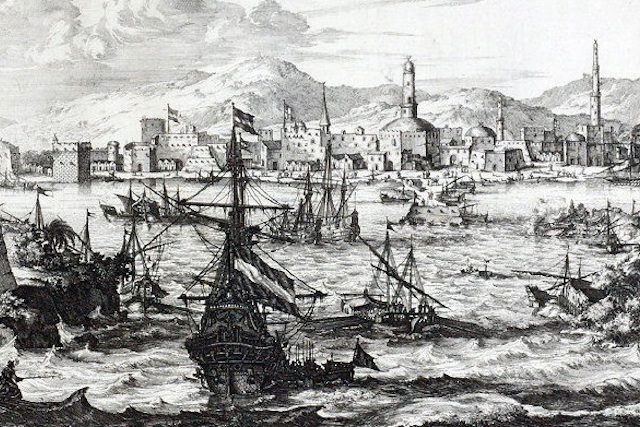
The British Empire existed as a monarchy throughout its existence, though the true credit for its rapid rise around the world could be squarely given to the East India Company. Think of it as a private firm with its own standing army and patronage from the monarch, as the EIC was instrumental in wrestling control of Britain’s colonies in South and Southeast Asia all on its own.
What most of us forget, though, is that the EIC also pioneered the blueprint for all ‘evil corporations’ to come after it. Its whole business model was set up around efficiently securing the natural resources from its colonies, with support from the central British state in exchange for a bulk of those resources and military backing. It was also the recipient of the world’s first corporate bailout in 1773, when the EIC ran into massive debt and caused banks across Europe to crash. It could be compared to the Wall Street Bailout of 2008, except the EIC was way bigger and more intertwined with global trade at that time than any of those banks ever would be.
6. 1857 Sepoy Revolt
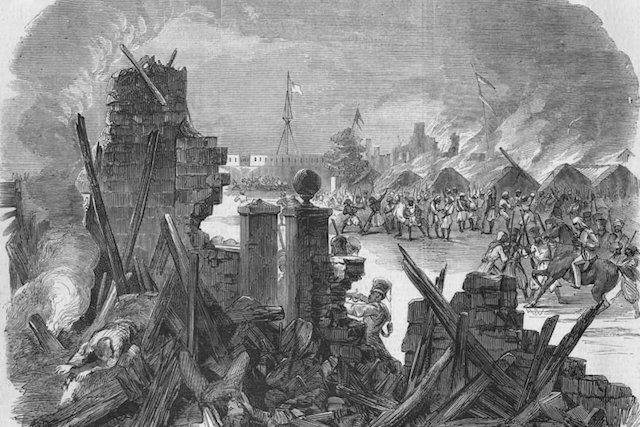
There’s no doubt that the EIC was one of the most successful corporations in history, with control over some of the most resource-rich and populous parts of the world at its peak. What started out as a loose group of merchants just trying to set up trading outposts in the East turned into a state of its own, with little to no oversight from the British government in its early days. If you’re wondering why we don’t hear about it as much as other successful business ventures in history, it’s because of the 1857 revolt in British-controlled India.
While the EIC had a standing army of its own, it wasn’t enough to control a territory as diverse and politically-complicated as India. That’s where the sepoys came in. An anglicized word for sipahi – which translates to soldier – they were soldiers picked from local populations to help the EIC army maintain control of the territory. That plan worked quite well for a while, too, until they decided to coat the rifle cartridges with pig and cow meat.
While the reasons behind the rebellion were diverse and numerous (much like all rebellions), the cartridges turned out to be the final straw. You see, the cartridges had to be picked with the teeth before being reloaded into the rifles, which was offensive to Hindu and Muslim sepoys. It gave way to one of the most brutal rebellions in the history of the British Empire, as the rebels came shockingly close to wrestling control of the whole territory. It caused quite a bit of outrage in Britain, too, as stories of rebels murdering British civilians living in India made its way there.
The rebellion was eventually suppressed, though it fundamentally changed how Britain dealt with its colonies. It marked the end of the East India Company, and put the British Indian territory directly under the monarch. It would stay that way until India’s independence in 1947.
5. Influence On Nazi Ideology

When we talk about the Nazis in the modern context, there’s always an air of shock to it. How could an ideology so opposed to human rights and just generally being nice to others gain a foothold in one of the world’s largest democracies of the time? Many reasons are cited, including the Treaty of Versailles and the Great Depression. While they may have contributed to it to an extent, what we often forget is that Nazi ideology never had to come out of the woodwork in the first place. The most problematic parts of it were already out in the open and widely-practiced, especially in the British Empire.
Hitler was massively influenced by British subjugation and control of its overseas territories – especially India – as he wanted to replicate it for Germany. He even referred to Eastern Europe as ‘Germany’s India’, though as we all know, that didn’t exactly go according to plan. The British Empire also kind of had a racism problem, as is proven by Churchill’s (and other British politicians’ of the time) frequent remarks on the colonies.
Moreover, many parts of the Nazi ideology were already popular across sections of governments in Europe, largely due to other countries wanting to replicate Britain’s success in their own colonies. A huge part of that was written out of Western history after the Second World War, though Hitler’s admiration for the British Empire remains well-documented. Despite that, the British Empire’s influence over the Nazis and fascists in Europe is almost never discussed.
4. The Bengal Famine
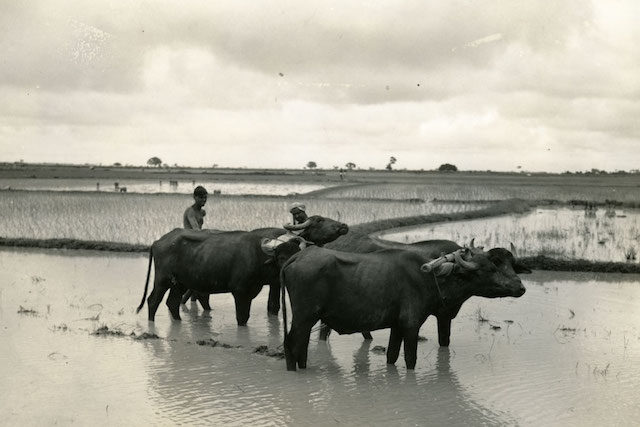
We’re no strangers to the disastrous policies of the British Empire, so much so that apologizing for them is a sort of an in-joke among the Brits at this point. From its infamous ‘divide and rule’ doctrine to the botched partitions of various countries in the wake of its departure from them, we’d say that we could fill a book with it, if there weren’t already many books like that. The fallout of those policies is still clearly visible in almost all of its economically-disadvantaged former colonies, in the form of inflamed racial and ethnic tensions as well as their economic backwardness after decolonization.
The Bengal Famine of 1943, however, is rarely ever mentioned as a part of that fallout, despite being one of the most devastating and controversial events in British Empire’s history. The mere fact that it’s known as a famine instead of a disaster caused by artificial scarcity of resources should tell you something about why it’s so rarely talked about. By some estimates, around 3 million of Bengal’s population died as a direct result of it, and many more were left malnourished for years to come, as it took quite some time for the state of Bengal – and India in general – to recover from it.
While the official position of Britain has always been that it was caused by a natural drought, recent studies have found that it wasn’t that natural after all. It was actually caused by the redirection of the food resources to Britain’s war effort and halted rice imports due to the Japanese invasion of Burma, as well as not declaring it a famine-hit region at the right time (or at any time since then). One study done on soil moisture data from that time concluded that Bengal was under no threat of a drought, and that the factors leading to the famine were purely manmade. To this day, the Bengal famine remains one of the most severe and deadly famines in history.
3. Still The Empire On Which The Sun Never Sets
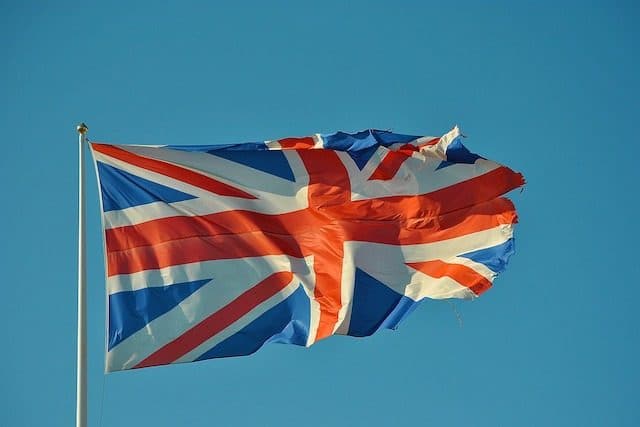
As we said above, the phrase ‘the biggest empire ever’ doesn’t mean much on its own, as we have no intuitive way of quantifying how big that actually is, especially considering that history is full of massive empires – like the Roman and Mongolian empires. Consider this; at its peak, the British Empire was so huge that it was daytime in at least some of its territory, earning it its unofficial nickname ‘the empire on which the sun never sets’. That’s not to say that it was the only empire like that – as other big empires of the time, like Spain, could also qualify for that description at some point in their history – though Britain held that reputation for far longer than any of them.
While Britain is far from its glory days now, surprisingly, the sun still doesn’t set on it, as it still has many of its former colonies under its control. Apart from the British mainland, there are 14 British territories around the world, and we’re assuming all of them are okay with the arrangement as they’ve not yet asked for independence. Some of those territories are British outposts in uninhabited, remote areas – like its Antarctic base – though they still count as British territory for all intents and purposes.
2. Its Contribution To The Current Conflict In The Middle East
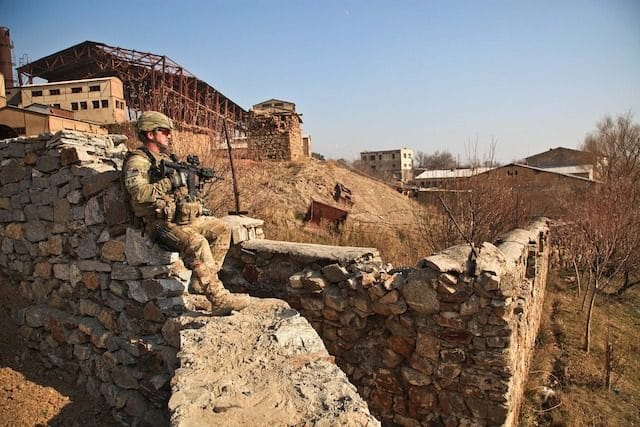
No matter which side of the story you listen to, you’d agree that the Middle East is in kind of a mess right now. With multiple factions – many of them extremist, armed groups – vying for control of vast tracts of countries like Syria and Iraq, there seems to be no end to the conflict. Well, not unless everyone mutually decides to call it quits and go back home. It’s made worse by underlying ethnic tensions between the various groups; tensions that have been unresolved and simmering under the surface for quite some time now. “Surely,” you’d probably wonder, “all of this couldn’t have happened overnight.” And you’d be right, because it didn’t.
In case you missed the title of the article, Britain had a huge role to play in what would inevitably, sooner or later, turn the Middle East into what it is today. It all started with the end of the First World War, when the Ottoman Empire’s territories were divided by Britain, with considerable help from France. Known as the Sykes-Picot agreement, the arrangement divided up the whole region according to spheres of influence and territorial ownership of the victors, with little to no regard for the actual ethnic demographics of the place.
To their credit, they didn’t know that they’d have to give up these territories at some point, as colonialism was still going strong around that time. Many terrorist groups in the Middle East still have the removal of the Sykes-Picot agreement as one of their primary aims, something we don’t even consider when we talk about the current state of the region.
1. The Disastrous Afghanistan Invasion
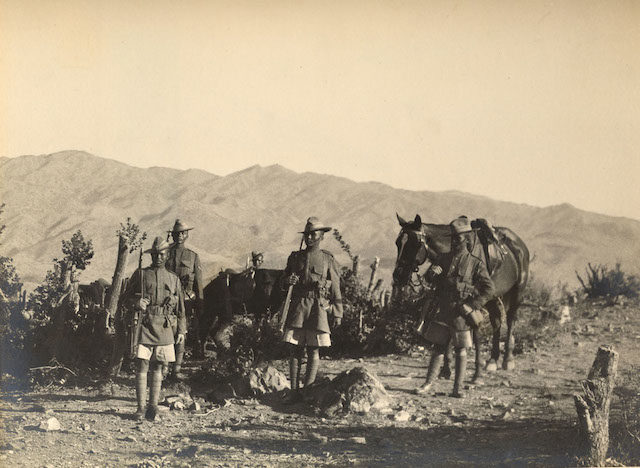
Afghanistan, for some weird reason, has been the focal point of many global conflicts in its history, right from the Soviet invasion in the ’80s to America’s ‘War on Terror’. Like Russia, many countries have discovered the hard way that Afghanistan isn’t the best place to invade, as it’s still a country largely ruled by independent warlords, with little oversight from the central government. The harsh and vast terrain doesn’t help the chances of invading armies, either.
What may be common knowledge now, though, wasn’t back in the middle of the 19th century, when the British Empire decided to make the same mistake as its later counterparts. Its invasion of Afghanistan in 1938 and eventual retreat in 1942 remains one of the empire’s biggest military defeats, despite its technological strength on the battleground.
It all began when the British army – made up of British and Indian soldiers – toppled the Afghan ruler, Dost Mohammed, and installed Shah Shujah Durrani in his place. While their original plan was to take the country and withdraw all of their forces, two of their brigades had to stay back to keep the peace, including their civilian family members. They eventually grew comfortable with their hold on the country, and decided to kick back and relax a bit in Kabul.
It was all going well till the local population started to revolt, as any occupied population would tend to. Because of the rapidly worsening situation, the British decided to take all of their troops (around 4,500 soldiers and 12,000 civilians) and withdraw back into India in 1842, with a promise of safe passage from the local army general. As you probably guessed, the Afghans did not honor that promise, and the British army was harassed and slowly decimated throughout their long journey back across the treacherous terrain. All in all, the entire British army was killed, except one British and a handful of Indian soldiers.
2 Comments
So. Yet another british empire bashing report. Nothing about helping the indians speak to each other over vast distances as they have several hundred.
Nothing about the transport systems that we created that connected the world.
Nothing about the founding colonies of most modern countries.
I could go on but as usual it’s better to be racist to the English, Northern Ireland, Wales and Scotland.
yea you can leave Scotland out of it, face it your empire is dead, silly brit